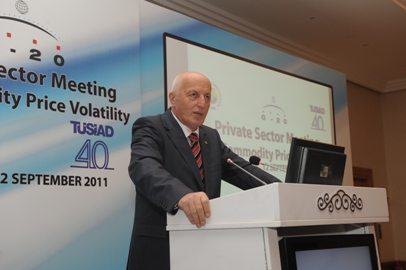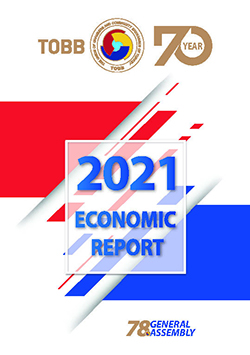TOBB Vice President Mete, “Turkey is the star of this term with its performance and recovery power”

12.09.2011 /
The Union of Chambers and Commodity Exchanges of Turkey (TOBB) Vice President Halim Mete reported that the star of this term is Turkey with its performance and recovery power.
Speaking at the start of the conference on “G-20 Private Sector Meeting: Fluctuations in Commodity Prices”, Mete said that Europe’s debt crisis, the worries about the recovery of the American economy and the political upheaval brought on by the Arabian Spring threatens stability worldwide.
Mete stated that, through relative prosperity, a new middle class was born and the middle class in developing Asia countries triple in only 18 years between 1990 and 2008. Naturally, the demand for basic consumer goods also tripled.
Halim Mete, Vice President of TOBB, stated that financial speculation, trade restrictions, the increase in commodity prices, low interest rates and fluctuations in the number of factors which are effective, but the economy’s basic rule must not be forgotten the in these situations, expressed the following views:
“When 2 billion people start to produce and earn money and therefore to consume, it is only to be expected that consumption demand would increase. The fastest growing parts of the world are likewise in Asia. Until the global economy finds its balance these fluctuations are natural. However, the long-term increase in commodity prices is permanent.
It is imperative that Turkey monitors the commodity prices of it’s the G-20 countries of which it is a member, as one of the 20 most advanced economies in the world.”
Mete stated that with the increased demand, agricultural land and mineral resources have become scarce proving the old mode of production and consumption to be unsustainable and that the world economy requires a revolution in thinking.
Mete stating that Turkey, with the momentum it provides has become attractive in the recent years and that even though its economy shrunk rapidly with the onset of the global crisis, he said that it was also one of the fastest to recover, indicative of the Turkish private sector’s dynamism.
This success was reinforced by achieving a growth of 11% in the first quarter of 2011, making Turkey the star of the period. Mete said, “Becoming an important actor among the countries of the region by increasing its trade volume, Turkey is set to become one of the important players in the commodity trade with its private sector’s dynamism. Individually, there is no other way of providing security of supply as a country. However, it is also evident that a global solution requires that it be developed by a collective action.”
Mete, representing the Turkish private sector, made the following suggestions; “A mechanism to ensure that everyone has equal access to increasingly scarce commodities must be established. The World Trade Organization must take precautions in this regard. The possibility of exploitation of mines and agricultural lands by sovereign states and third world countries must be prevented. A proper flow of information is required for this. All elements preventing exports and free formation of prices must be abolished. Innovative solutions to address the increase of demand must be implemented. My belief in the private sector which produced less fuel consuming vehicles after the oil crisis of 1970 to produce methods which consume less raw materials. However this can only be achieved with the support of the state.”
- TÜSİAD Board President Ümit Boyner
Turkish Industrialists’ and Businessmen’s Association (TÜSİAD) Board President Ümit Boyner stated that, “The increase in commodity prices and prices variations has a chance to instigate a period of stagflation in the global economy, however slight as it may be.”
Stating that the last financial crisis has further accelerated the process of transition to a multi-centered economic system, Boyner said that defining a focal point of the global economy today was much harder than it was 10 years ago and that 10 years ago, the economic system was transatlantic based whereas now we must consider it Pacific based with new focal points on the rise.
Pointing out the sharp increase in commodity and raw materials prices and high fluctuations recently, Boyner said that commodity price increases, especially food and agricultural goods, effect economy, society and even politics.
Ümit Boyner stated that in the short term, the increased price levels and price fluctuations adversely affect every portion of the economy while a study on the reaction dynamics reveals that high prices affect consumption decisions whereas high fluctuations affect investment decisions.
Stating that the decision making processes of these two essential parts of the economy deeply affects the economy of countries and the world as a whole, Boyner went on,
“The suppression of growth is just one of its effects. We know that increases in commodity prices and price fluctuations can cause stagflation in the world economy however slight that chance. These negative impacts to prices also jar communities through households, pushing tens of millions below the hunger threshold. The main problem that needs to be focused on right now is the need for strong economic cooperation on an international scale.”
In this regard, Boyner emphasized that a sustainable work and investment environment with transparent and predictable policies and an uncompromised competitive market economy is needed.
- Bruno Bensasson
G-20 Commodity and Raw Materials Work Group Member Bruno Bensasson stated that the high prices and price fluctuations in all countries is cause for concern, especially oil prices.
Stating that the increase of food and oil prices causes social problems, with food problems causing humanitarian crises, Bensasson said that the reason for high prices and and fluctuations lies with the real economy.
Bensasson stated that these problems may stem from difficulties that might arise in the supply-demand balance and said that all of these were caused by the unexpected high growth in the 2000s.
Your message has been sent
Thank you |




